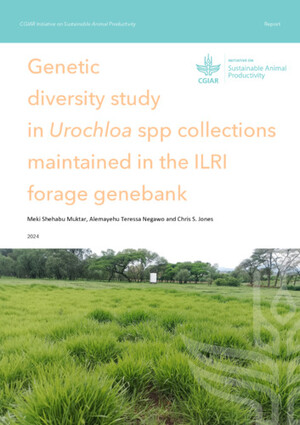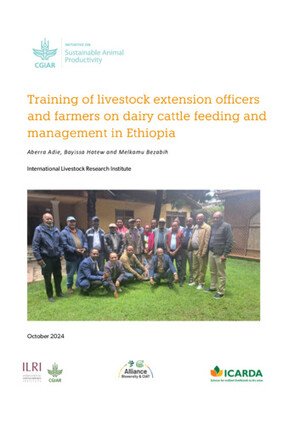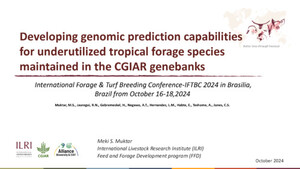
An update on the global strategy for the conservation and utilisation of tropical and subtropical forage genetic resources
Abstract
Tropical and sub-tropical forages (TSTF) are critically important for supplying livestock feed and environmental benefits in extensive and intensive livestock systems of developed and developing countries. There has been focused collection and conservation of forage genetic resources (FGR), and research on their diversity, adaptation and use for the past 60 years. This laid the foundations for the impacts TSTF have had, and continue to have. However, since about 1995 there has been significant reduction in forage science investment, and capability globally, and that has strangely coincided with the accelerated demand for livestock products. The status of TSTF germplasm conservation, capability and capacity are now at risk, and the decline must be reversed if the tropical and subtropical farming systems are to access the best genetic material and knowledge to meet the growing food/environmental needs. A strategy to reduce barriers to TSTF conservation, research and utilisation was developed under the Global Crop Diversity Trust in 2015 with input from across the TSTF-genetic resources community. Its aim was to build a functional network of national, regional and international genetic resource centres, introduce operational efficiencies, and enable genebanks to improve their role as knowledge managers and advisors for research and development programs. The strategy’s main objectives are: 1) Rebuild the community of TSTF genebanks and genebank users to develop closer collaboration and trust; 2) Ensure more efficient and rationalized conservation within and among genebanks; and 3) Actively support utilisation by anticipating germplasm needs and responding to users’ requests for information and seeds. Implementation of the strategy commenced in 2016, with the first aim being to win buy-in and cooperation of international and national genebanks. A new Newsletter, ‘Forages for the Future’, has >600 recipients and reports key implementation activities and the roles of forages across the tropics and subtropics. Making recent impacts more widely known indirectly helps build the body of evidence that improved forages deliver impacts and is the basis for growth in financial and human resources invested in TSTF. The CGIAR genebanks of ILRI and CIAT play key roles in TSTF research and use. In recognition of the need for greater efficiencies and better utilisation of the germplasm, ILRI and CIAT have undertaken an ambitious program to align collections to provide a one stop portal, with prioritised species/accessions for conservation and research, and a simplified germplasm request process. This change is occurring simultaneously with a TSTF strategy initiative encouraging some key national TSTF centres to work more closely together and with the CGIAR centres and with the update of the widely used TSTF database and selection tool, SoFT, with new content and ability to be used on smart phones. That new version will be released in 2019. Reversing the past downward trend requires the commitment and long-term engagement of partner countries and the donor community. The alternative is that 60 years of knowledge and expertise will have to be rebuilt, and generations of farmers and other users will not realize the production and environmental benefits that well-adapted and sustainably managed improved forages can attain.
Citation
Pengelly, B.C., Maass, B.L., Lusty, C.E. and Jones, C.S. 2018. An update on the global strategy for the conservation and utilisation of tropical and subtropical forage genetic resources. Presented at the 53rd Annual Congress of the Grassland Society of Southern Africa, Johannesburg, South Africa, 22-27 July 2018. Bonn, Germany: Crop Trust.










